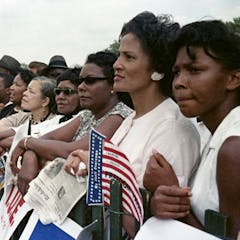
Articles on Voting rights
Displaying 1 - 20 of 92 articles

Canadians should watch events in Alberta very carefully because voter ID laws are often the first step of many in restricting the voting rights of eligible citizens. They spread and escalate quickly.

Historically, federal courts prioritized voting rights and legal congressional districts for upcoming elections above all other concerns. But the Supreme Court changed that in 2022.

Fannie Lou Hamer became one of the most respected civil rights leaders during the 1960s in part because of her resistance to racist voting laws in Mississippi.

We are living in an era of democratic backsliding. It is becoming increasingly vital to improve the quality of elections.

The commission has tight deadlines to finalize new maps. 2 voting rights experts explain the messy situation.

Shows, movies and day-to-day language promote myths about voodoo that reinforce more than a century of stereotypes and discrimination, writes a scholar of Africana studies.

Without much scrutiny or fanfare, Edward Blum has led the attack against federal minority voter protection laws and the use of race in college admissions.

The ruling could make it impossible for groups like the ACLU to file lawsuits to protect people’s right to vote – significantly changing how the Voting Rights Act has been interpreted so far.

Since 2020, Alabama lawmakers have failed to draw political districts that give Black voters an equal chance of selecting political candidates that represent their interests.

Since 2020, Alabama lawmakers have failed to draw political districts that give Black voters an equal chance of selecting political candidates that represent their interests.

Hand-counting every ballot might sound like a great idea, but it’s both slower and less accurate than machine-counting votes.

One of the charges against Donald Trump dates back to the 1870s and was designed to give the federal government the power to ensure states held free and fair elections.

Two Supreme Court rulings on the use of race appear at odds with each other. Blame Chief Justice Roberts’s ambivalence on race, a constitutional law scholar writes.

The meaning of the Constitution’s preamble, which begins with the words ‘We the People,’ has evolved over time as voting rights have expanded.

It’s official: State courts can review lawmakers’ election-district boundary decisions to ensure they comply with state law.

At a time when state legislatures are enacting laws that restrict who, when and where people can vote, the US Supreme Court ruled to protect voting rights.

It will take a lot of strategic ingenuity to fight the rise of populism. And it will get harder to do so as politicians rig the game with rules designed to reduce voting.

If Democrats embrace and deploy the Constitution leading up to the 2024 election, it will enable them to offer a confident message based on the hallowed principles of America’s founding charter.

From family to grassroots activists, these are some of the women who shaped MLK’s vision and campaigns.

Will the GOP continue to stoke white grievance, or pursue a multiracial strategy that can expand its reach? Recent trends suggest that it can do both at once.
